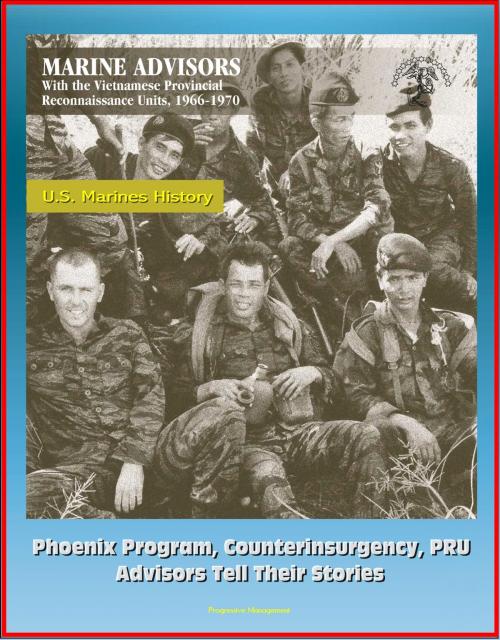U.S. Marines History: Marine Advisors with the Vietnamese Provincial Reconnaissance Units, 1966-1970 - Phoenix Program, Counterinsurgency, PRU, Advisors Tell Their Stories
Nonfiction, History, Military, Vietnam War, Asian| Author: | Progressive Management | ISBN: | 9781301504473 |
| Publisher: | Progressive Management | Publication: | January 12, 2013 |
| Imprint: | Smashwords Edition | Language: | English |
| Author: | Progressive Management |
| ISBN: | 9781301504473 |
| Publisher: | Progressive Management |
| Publication: | January 12, 2013 |
| Imprint: | Smashwords Edition |
| Language: | English |
During the latter stages of the Vietnam War, small teams of dedicated and courageous Vietnamese special police, led by American military and Central Intelligence Agency (CIA) personnel, fought a largely unsung war against the political leadership of the Communist insurgency. These special police units were called Provincial Reconnaissance Units (PRUs), and they conducted some of the most dangerous and difficult operations of the Vietnam War. Because these units were created, trained, equipped, and managed by the CIA, they worked in secret, a status that often led to myths and falsehoods about their activities. So pervasive are these myths and falsehoods that many historians often take them at face value without subjecting them to the same scrutiny as other historical aspects of the Vietnam War. This lack of understanding is further complicated because of the political divisiveness within the United States surrounding the Vietnam War, which led some opponents of U.S. involvement in that war to accept the most pernicious and false claims made against the entire pacification effort conducted by the American and South Vietnamese governments.
U.S. Marines as advisors have a long history, from Presley O'Bannon at Tripoli through Iraq and Afghanistan via Haiti, Dominican Republic, Nicaragua, China, South Korea, Taiwan, Philippines, and Vietnam. While most Marines think of the Vietnamese Marine Corps as the primary advisory experience during that conflict, others served with various other advisory programs with the U.S. Army, U.S. Navy, U.S. Joint Special Operations, and U.S. Civil Operations and Rural Development Support. One of these is the subject of this study: Marine advisors with the Vietnamese Provincial Reconnaissance Units (PRUs). This narrative is a combination of experience, research, and reflection. While other journalistic or academic accounts have been published, this is a narrative of participants.
Many historians consider the two most effective counterinsurgency organizations employed during the Vietnam War to have been the PRU and USMC Combined Action Platoons (CAP). In both cases, U.S. Marines played a significant role in the success of these innovative programs. It should be pointed out, however, that the number of U.S. Marines assigned to these programs was small and the bulk of the forces were locally recruited fighters. Both programs used a small cadre of Marines providing leadership, training, and combat support for large numbers of indigenous troops, and in so doing, capitalized on the inherent strengths of each.
The Beginning * PRU Organization, Recruitment, Equipment, and Command and Control * Sergeant Paul C. Whitlock: One of the First and Best, 1966-67 * Sergeant Ronald J. Lauzon: Hue City, 1967 * Staff Sergeant Wayne W Thompson: Leadership Challenges and Spies, 1967-68 * First Lieutenant Joel R. Gardner: A Marine in II Corps, 1967-68 * Lieutenant Colonel Terence M. Allen: The Perspective from Saigon, 1968-70 * Death at the Embassy House: Tet, 1968 * Sergeant Rodney H. Pupuhi: I Corps, Post-Tet 1968 * First Lieutenant Douglas P Ryan: I Corps, 1968-69 * Capt Frederick J. Vogel: I Corps, 1969 * A Typical Operational Scenario: Tay Ninh, 1970 * Conclusions * Lessons Learned * Sources * Bibliography * Appendix: U.S. Marine Provincial Reconnaissance Unit Advisors * Endnotes
During the latter stages of the Vietnam War, small teams of dedicated and courageous Vietnamese special police, led by American military and Central Intelligence Agency (CIA) personnel, fought a largely unsung war against the political leadership of the Communist insurgency. These special police units were called Provincial Reconnaissance Units (PRUs), and they conducted some of the most dangerous and difficult operations of the Vietnam War. Because these units were created, trained, equipped, and managed by the CIA, they worked in secret, a status that often led to myths and falsehoods about their activities. So pervasive are these myths and falsehoods that many historians often take them at face value without subjecting them to the same scrutiny as other historical aspects of the Vietnam War. This lack of understanding is further complicated because of the political divisiveness within the United States surrounding the Vietnam War, which led some opponents of U.S. involvement in that war to accept the most pernicious and false claims made against the entire pacification effort conducted by the American and South Vietnamese governments.
U.S. Marines as advisors have a long history, from Presley O'Bannon at Tripoli through Iraq and Afghanistan via Haiti, Dominican Republic, Nicaragua, China, South Korea, Taiwan, Philippines, and Vietnam. While most Marines think of the Vietnamese Marine Corps as the primary advisory experience during that conflict, others served with various other advisory programs with the U.S. Army, U.S. Navy, U.S. Joint Special Operations, and U.S. Civil Operations and Rural Development Support. One of these is the subject of this study: Marine advisors with the Vietnamese Provincial Reconnaissance Units (PRUs). This narrative is a combination of experience, research, and reflection. While other journalistic or academic accounts have been published, this is a narrative of participants.
Many historians consider the two most effective counterinsurgency organizations employed during the Vietnam War to have been the PRU and USMC Combined Action Platoons (CAP). In both cases, U.S. Marines played a significant role in the success of these innovative programs. It should be pointed out, however, that the number of U.S. Marines assigned to these programs was small and the bulk of the forces were locally recruited fighters. Both programs used a small cadre of Marines providing leadership, training, and combat support for large numbers of indigenous troops, and in so doing, capitalized on the inherent strengths of each.
The Beginning * PRU Organization, Recruitment, Equipment, and Command and Control * Sergeant Paul C. Whitlock: One of the First and Best, 1966-67 * Sergeant Ronald J. Lauzon: Hue City, 1967 * Staff Sergeant Wayne W Thompson: Leadership Challenges and Spies, 1967-68 * First Lieutenant Joel R. Gardner: A Marine in II Corps, 1967-68 * Lieutenant Colonel Terence M. Allen: The Perspective from Saigon, 1968-70 * Death at the Embassy House: Tet, 1968 * Sergeant Rodney H. Pupuhi: I Corps, Post-Tet 1968 * First Lieutenant Douglas P Ryan: I Corps, 1968-69 * Capt Frederick J. Vogel: I Corps, 1969 * A Typical Operational Scenario: Tay Ninh, 1970 * Conclusions * Lessons Learned * Sources * Bibliography * Appendix: U.S. Marine Provincial Reconnaissance Unit Advisors * Endnotes















